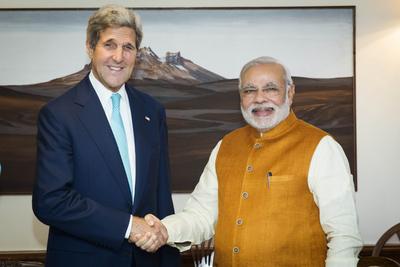Who in their right mind would want to walk away from adopting the best practices internationally in border processing and logistics and giving effect to an agreement for mobilising the international resources and capacity to help do that in developed and developing countries around the world?
India would, apparently, but why? For two reasons, it might be suggested.
The first is rooted in the mindset of trade negotiators. Blocking global trade facilitation is construed as part of a tactic by Indian negotiators to gain exemption from multilateral scrutiny of India’s agricultural protection, ostensibly to achieve food security objectives. This tactical exchange is symptomatic of what’s wrong with the global trade regime today and why Prime Minister Modi (if he were able) would be well advised to relieve some of his loyal but misguided servants of their duties or encourage them to think again…deeply. Of course it’s not just Indian trade diplomats that are stuck in a frame of mind that prioritises socking it to the ‘other’ side in tit-for-tat exchanges of ‘concessions’ instead of achieving what’s in the best interests of your nation and the world more broadly. They come in every nationality and the profession has multiplied them prodigiously in the fertile field of endless trade negotiations — bilateral, regional as well as multilateral — over the past couple of decades.
The well-researched truth is that the biggest gains from rounds of trade liberalisation come from what countries take to the table themselves in the form of trade opening, not from concessions wrung out of other parties, although that sometimes dominates and thwarts the game. The need to reinvigorate India’s economic reform, and connect the national development agenda to opening up the economy to business globally, especially through new business in its domestic manufacturing sector where the jobs will have to be created, should be plainer and plainer for all to see.
The second, more substantial, reason is that India does have a problem with how its food security policies stack up against WTO rules. But blocking progress on the trade facilitation agreement is not the way to go about dealing with that, especially when there is space to sort out the agricultural protection issue over the coming two years or so.
India can, as Arvind Subramanian has suggested, attempt to change the structure of India’s WTO obligations on agriculture to make them less inefficient and trade-distorting. ‘To show its good faith, it should offer to restrict its ability to impose tariffs in return for greater — but not open-ended — freedom to grant domestic subsidies… It could argue further that the structure of obligations is biased against India, because rich countries can subsidise agricultural exports while India cannot’.
The good news is that on this issue, India is alone against the world and will hopefully reconsider its position quickly.
As Bill Overholt argues in our lead this week, it’s time to re-think the global trade regime more generally. Mari Pangestu and David Nellor have made a powerful case for making this a priority for the upcoming G20 Summit in November. They point out that over the past decade global trade and investment discussions have moved far away from the formal global trade regime. The multilateral system has been bogged down in the Doha Development Round — defined by a single undertaking and a fixed agenda that is increasingly out-of-date. Meanwhile, many countries have devoted their energies to bilateral and, latterly, regional trade and investment discussions.
Overholt argues that ‘without a radical rethink, we risk the gradual decay of our most valuable international institutions, loss of extraordinary opportunities to improve global living standards and possibly the sidelining of the West in developing modern institutions. The GATT and the WTO were devised for a simpler era… By the last decade of the twentieth century, production had become a complex global process. The logic of increasing efficiency by reducing trade barriers remained completely valid, but policy adaptation of that logic to a new era has faltered’.
Continued failure to address the real issues of our emerging world of globalised production and consumption, and the reality of China’s central role, Overholt suggests, ‘could lead to trade regimes with the most dynamic markets governed by structures like the Regional Comprehensive Economic Partnership promoted by Asian emerging economies’.
Pangestu and Nellor are clear: G20 leaders need to put their heft behind re-invigorating the regime. Their idea is for leaders to engage a group of experts to work with the G20 leadership on a plan for making the world trade and investment regime work better to capture the gains of trade and investment for global growth. The first tentative steps were taken at a G20 trade ministers meeting in Sydney the week before last. But will these steps be bold enough?
Peter Drysdale is Editor of the East Asia Forum.

